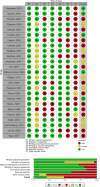Identifying the Best Initial Oral Antibiotics for Adults with Community-Acquired Pneumonia: A Network Meta-Analysis
- PMID: 38360961
- PMCID: PMC11116361
- DOI: 10.1007/s11606-024-08674-1
Identifying the Best Initial Oral Antibiotics for Adults with Community-Acquired Pneumonia: A Network Meta-Analysis
Abstract
Background: The objective of this network meta-analysis was to compare rates of clinical response and mortality for empiric oral antibiotic regimens in adults with mild-moderate community-acquired pneumonia (CAP).
Methods: We searched PubMed, Cochrane, and the reference lists of systematic reviews and clinical guidelines. We included randomized trials of adults with radiologically confirmed mild to moderate CAP initially treated orally and reporting clinical cure or mortality. Abstracts and studies were reviewed in parallel for inclusion in the analysis and for data abstraction. We performed separate analyses by antibiotic medications and antibiotic classes and present the results through network diagrams and forest plots sorted by p-scores. We assessed the quality of each study using the Cochrane Risk of Bias framework, as well as global and local inconsistency.
Results: We identified 24 studies with 9361 patients: six at low risk of bias, six at unclear risk, and 12 at high risk. Nemonoxacin, levofloxacin, and telithromycin were most likely to achieve clinical response (p-score 0.79, 0.71, and 0.69 respectively), while penicillin and amoxicillin were least likely to achieve clinical response. Levofloxacin, nemonoxacin, azithromycin, and amoxicillin-clavulanate were most likely to be associated with lower mortality (p-score 0.85, 0.75, 0.74, and 0.68 respectively). By antibiotic class, quinolones and macrolides were most effective for clinical response (0.71 and 0.70 respectively), with amoxicillin-clavulanate plus macrolides and beta-lactams being less effective (p-score 0.11 and 0.22). Quinolones were most likely to be associated with lower mortality (0.63). All confidence intervals were broad and partially overlapping.
Conclusion: We observed trends toward a better clinical response and lower mortality for quinolones as empiric antibiotics for CAP, but found no conclusive evidence of any antibiotic being clearly more effective than another. More trials are needed to inform guideline recommendations on the most effective antibiotic regimens for outpatients with mild to moderate CAP.
Keywords: antibiotics; clinical response; community-acquired pneumonia; guidelines; mortality; network meta-analysis; outpatient; pneumonia.
© 2024. The Author(s), under exclusive licence to Society of General Internal Medicine.
Conflict of interest statement
The authors declare that they do not have a conflict of interest.
Figures





References
-
- Metlay JP, Waterer GW, Long AC, et al. Diagnosis and Treatment of Adults with Community-Acquired Pneumonia an Official Clinical Practice Guideline of the American Thoracic Society and Infectious Diseases Society of America. Am J Respir Crit Care Med. 2019;200(7):e45–e67. doi: 10.1164/rccm.201908-1581ST. - DOI - PMC - PubMed
-
- National Institute for Health and Care Excellence (NICE), Pneumonia (community-acquired): antimicrobial prescribing; NICE Guideline [NG138]. 2019 . Available from: https://www.nice.org.uk/guidance/ng138 [Accessed February 28, 2023].
-
- Wiersinga WJ, Bonten MJ, Boersma WG, et al. Management of community-acquired pneumonia in adults: 2016 guideline update from the Dutch Working Party on Antibiotic Policy (SWAB) and Dutch Association of Chest Physicians (NVALT) Neth J Med. 2018;76(1):4–13. - PubMed
-
- Ewig S, Kolditz M, Pletz M, et al. Management of Adult Community-Acquired Pneumonia and Prevention - Update 2021 - Guideline of the German Respiratory Society (DGP), the Paul-Ehrlich-Society for Chemotherapy (PEG), the German Society for Infectious Diseases (DGI), the German Society of Medical Intensive Care and Emergency Medicine (DGIIN), the German Biological Society (DGV), the Competence Network CAPNETZ, the German College of General Practitioners and Family Physicians (DEGAM), the German Society for Geriatric Medicine (DGG), the German Palliative Society (DGP), the Austrian Society of Pneumology Society (ÖGP), the Austrian Society for Infectious and Tropical Diseases (ÖGIT), the Swiss Respiratory Society (SGP) and the Swiss Society for Infectious Diseases Society (SSI) Pneumologie. 2021;75(9):665–729. doi: 10.1055/a-1497-0693. - DOI - PubMed
Publication types
MeSH terms
Substances
LinkOut - more resources
Full Text Sources
Medical
Miscellaneous

